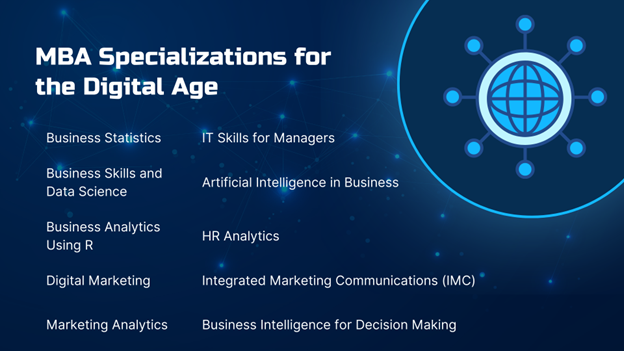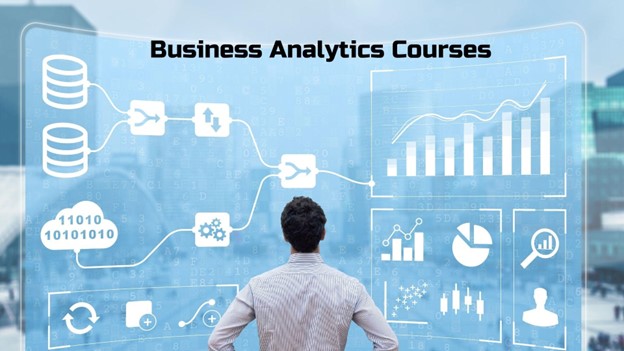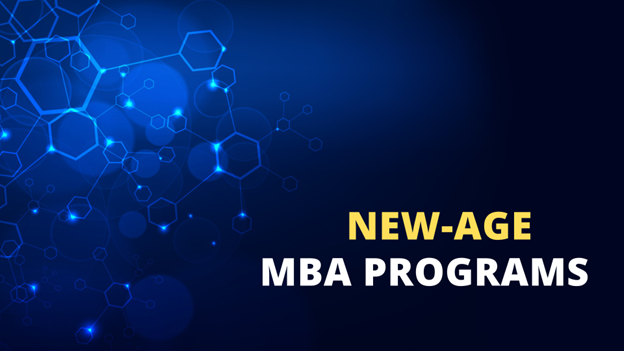The digitization of the business world is relentless. As companies evolve to navigate this new landscape, the demand for skills in areas like data analytics, artificial intelligence, and digital marketing has skyrocketed. Recognizing this shift, Indian MBA programs have quickly adapted to stay at the forefront of this transformation.
Top-notch colleges in India, such as IIM Ahmedabad, NMIMS Global, and BITS Pilani, have already incorporated online MBA programs. Designed especially for working professionals or individuals who may not be able to access traditional campus-based programs, these online platforms provide flexibility without compromising on content.
MBA Specializations in Digital Domains

More institutions are now offering MBA specializations tailored to the digital age. SMS Varanasi, for instance, has curricula focusing on digital marketing, ensuring that students are equipped to handle contemporary digital challenges.
But it doesn’t just stop at online programs and digital marketing. Here’s a closer look at some of the transformative courses that MBA programs these days are offering:
Business Statistics: Business Statistics is one of the essential MBA courses that immerses students in the methodology for gathering, analyzing, interpreting, and presenting data.
Covering areas such as:
- descriptive statistics,
- probability concepts,
- data distributions,
- linear regression models, and
- hypothesis testing.
The course empowers students with the tools imperative for informed business decision-making.
A profound understanding of these statistical methods allows future managers to discern consumer behaviour, detect significant trends using data visualization, and gauge the correlation between pivotal business variables using regression models.
In a dynamic business environment, mastery of Business Statistics equips managers with foresight, aiding them in anticipating and tackling challenges effectively.
IT Skill for Managers: This MBA specialization is specially tailored to nurture managers with the adeptness needed to steer IT departments efficiently within any enterprise.
This curriculum not only educates managers about the nuances of team management, communication, and strategic thinking but also refines their negotiation and planning capabilities.
By diving into these pivotal topics, future managers are better equipped to lead teams cohesively and communicate more effectively across various business domains.
Moreover, by honing strategic thinking skills, managers can take judicious decisions that bolster innovation and ensure sustained growth, establishing a competitive edge in today’s tech-driven business world.

Business Analytics and Data Science: This MBA course helps students gain an in-depth understanding of how to harness data to drive crucial business decisions.
The diverse topics in this course range from:
- data mining,
- machine learning,
- statistical modelling, and
- a panoramic view of the analytical landscape.
This knowledge helps managers glean insights into consumer behaviour, identify key business trends, and establish a relationship between different variables to influence business outcomes.
The course prepares managers to utilize these skills in practical scenarios, ensuring they remain agile and adaptive in the face of evolving business challenges.
Artificial Intelligence in Business: Deep dive into the transformative potential of AI and ML within the business realm with this MBA specialization. It covers areas such as:
- big data integration,
- machine learning applications in finance, and
- the operational shifts ushered in by AI.
It enables future managers to harness AI for process automation, streamlining services, and making incisive, data-backed decisions.
As businesses pivot to more tech-centric strategies, a robust understanding of AI’s capabilities can help you navigate challenges and capitalize on emerging opportunities.
Business Analytics Using R: This course introduces MBA students on how the R programming language can be used to solve intricate business problems. Using analytical tools like R and advanced Excel, future managers learn to master data collection and what are its practical applications.
As R gains prominence for its prowess in data analysis and visualization, managers proficient in this language are poised to make data-centric decisions.
This course ensures that future managers are equipped with goal-oriented strategies backed by real-time management skills, priming them for success in a data-driven business environment.

HR Analytics: Human Resource (HR) fields are undergoing significant evolution, and the HR Analytics module stands as a pivotal contributor to this progressive change.
This curriculum emphasizes the analytical approach to human resources data, focusing specifically on refining vital HR functions, such as:
- Recruitment,
- Performance oversight, and
- Employee relationship management.
Leveraging statistical techniques, data representation, and advanced machine learning methodologies, management professionals can significantly elevate various HR dimensions. To exemplify, data related to recruitment aids in optimizing sourcing channels, whereas performance metrics highlight necessary areas of intervention.
To encapsulate, HR Analytics provides prospective managers with an analytical foundation to enhance workforce management strategies, a cornerstone for sustainable business expansion.
Digital Marketing: Digital marketing pertains to the utilization of online platforms—including search engines, social media, emails, and websites—to endorse products or services.
The curriculum for a digital marketing module encompasses:
- Search Engine Optimization (SEO),
- Social Media Outreach,
- Email-based Promotion,
- Content-driven Marketing, and
- Marketing tailored for mobile platforms.
It’s imperative for upcoming managers to grasp digital marketing nuances, enabling them to effectively engage their desired audience.
Given the modern era, wherein the vast populace relies on mobile devices for online research prior to procurement, strategies in digital marketing stand indispensable for commercial entities.
Integrated Marketing Communications (IMC): The IMC methodology champions a holistic marketing communication approach, emphasizing the synergy achieved by amalgamating diverse marketing mediums.
Key areas broached in an IMC curriculum include:
- Advertisement strategies,
- Public relationship management,
- Direct promotional endeavours,
- Sales-centric promotions, and
- Individualized selling techniques.
For budding managers, an adept understanding of IMC is quintessential, ensuring the delivery of a uniform brand narrative across varied communication platforms.
In today’s interconnected world, where consumer-brand interactions are prevalent across platforms like Facebook, Twitter, and Instagram, IMC becomes a linchpin in nurturing community trust and shared values.

Marketing Analytics: Marketing analytics is delineated as the strategic use of data to assess the efficacy of varied marketing campaigns.
The curriculum of a marketing analytics module sheds light on:
- Analyzing data,
- Market-centric analysis,
- Brand stewardship,
- Effective communication methodologies,
- Understanding customer behaviour, and
- Comprehensive market research.
Emerging managers, equipped with insights from marketing analytics, are positioned to take informed decisions, refining their promotional blueprints.
In our data-rich epoch, having an arsenal of analytical tools is paramount for formulating astute, data-backed marketing initiatives.
Business Intelligence for Decision Making: Business intelligence encapsulates the strategic employment of data to facilitate decision-making across diverse commercial arenas.
This module’s curriculum delves into:
- Data analytics,
- Simulative techniques,
- Business-centric analytics, and
- Mathematical optimization strategies.
For tomorrow’s managers, proficiency in business intelligence is invaluable, paving the way for swift, precise, and consistent verdicts, especially when integrated with Artificial Intelligence.
In this era, characterized by data omnipresence, harnessing business intelligence is a fulcrum for robust decision-making processes. In summation, as the technological milieu metamorphoses, Indian MBA curricula are not just adapting but often pioneering advancements. By integrating modern-day business essentials into their syllabi, these academic programs are ensuring their graduates are primed for the forefront of the digital commercial revolution.





